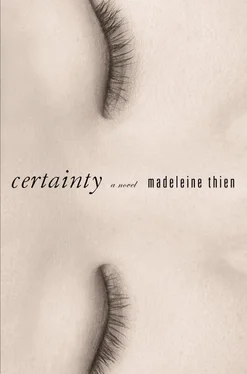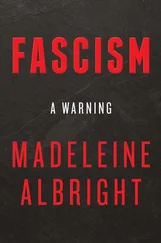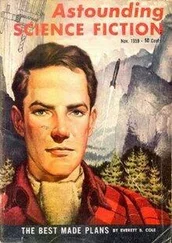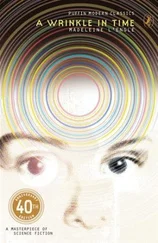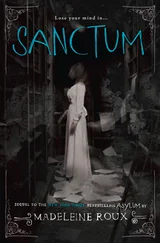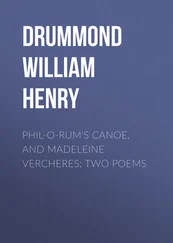In her mind, she sees the kerosene lamps, the still plantation. The air is filled with the sound of nocturnal birds and cicadas, the sound of a small boy counting aloud, the thirtieth row, the thirtieth tree. When he finds the place that he is looking for, he begins to remove the earth. He works desperately, steadily, and the shadows of the trees fall around him like the lines of an imaginary house. How far must he travel? At what point will the treasure that he carries be safe?
Onstage, the first two girls hold their position while the third arches her back and swings her legs until she is upside down. She tilts her face up and gazes calmly at the audience. For several seconds they remain motionless, and then the girl at the very bottom begins to walk from one side of the stage to the other. Their bodies tremble with exertion, and the girls sway back and forth.
On her lap, Wideh strains forward towards the stage. He is under the spell of the acrobats, the man who dove through the air, unafraid; and now this small girl who blooms like a flower atop the human ladder.
Beside her, Saskia takes Ani’s hand, holding on as if she, too, can anchor her own body there, in the theatre.
The next morning, at the harbour, everything happens quickly. Siem and Saskia carry the luggage, while Ani gathers the children to her. Together, they make their way towards the registration desks.
The sun is starting to rise now, colouring the edges of the horizon. Ani kneels on the ground beside Wideh and Tash, and the crowd passes around them. Dutch soldiers are trying to organize the emigrants. They hurry people towards the gangway, and the crying and laughing rises in pitch and volume. She does not want to say goodbye, but Saskia whispers in her ear the old saying: “All things change and we change with them.” For a long time they stand holding one another.
By dawn, the great ship in the Jakarta harbour is boarded and sunrise floods over the sea, the water a deep and brilliant orange. The crowd on the dock has thinned now. As the horn sounds, some wave handkerchiefs, others lift both arms in the air, as if they, too, are floating on the water. Among the hundreds of people leaning over the ship’s rail, Ani cannot find the Dertiks. It is Wideh who sees them first: Tash, perched on Siem’s shoulders, and Saskia pressed close to them. They have almost disappeared into the multitude. The ship begins to move away from the harbour. She holds Wideh close to her as she watches the disappearing form.
VANCOUVER, CANADA
O n the morning of her thirty-ninth birthday, Gail wakes up to the warmth of the light through the attic windows. Ansel is lying on his side, one hand on the curve of her waist. In Gail’s vision, without her glasses or contact lenses, he is blurred and indistinct, like someone in the farthest reaches of a swimming pool. From their bed under the steep roof, she can see the change from night to day, evening stars, rainfall tapping insistently on the glass. Some mornings, Gail wakes up to the sound of their elderly neighbour across the street, Mrs. Cho, who trims her yard with a pair of children’s scissors.
When Ansel wakes, they climb out from under the covers and dress in comfortable clothes. She takes a comb and does her best to calm Ansel’s hair, which is tossed like grass on a wind farm. He makes the bed and picks her pyjamas off the floor. By the time they have stepped outside, they have spoken only a few sentences, yet she feels a tentative peace. They move as if in memory of a different day, of countless similar mornings.
They used to have a running joke, she and Ansel. When people asked how long they had been together, they’d say the first number that came into their heads. “Twenty-five years?” Ansel would respond, turning to Gail, eyebrows raised. “Or is it more?” Forty years, perhaps. What, in their minds, seems a lifetime, a history together. She remembers this joke with pleasure, because it returns her to a time when their relationship was carefree, when it harboured neither suspicion nor fear. For almost a month now, she has known about Ansel’s affair with a woman named Mariana. It remains as a space between them, around which they carefully move.
They walk to the New Town Bakery, where they choose their breakfast from the display case and the high stacks of bamboo steamers. Then they continue, under the Georgia Viaduct, towards False Creek. It is early Sunday morning, and the city still drowses. Ansel counts two or three sails unfurled on the windless bay.
Tonight, her parents and a few close friends will come over for dinner. Her parents had wanted to host the party, but she had put them off. Knowing them, such a party would involve a ten-course dinner, towering cake and enough sparklers to light the neighbourhood. Even at the best of times, she has never felt comfortable as the centre of attention. Perhaps, she had thought, handling it herself would keep things low-key, and take the pressure off the occasion.
They are sitting on a wooden bench, facing the creek. Ansel tells her to be alert for seagulls. Just the other day, he says, he saw one swoop towards the bus shelter and seize a sandwich straight from the hand of a young woman. A freak occurrence, Gail says, but she clutches her breakfast tighter and scans the skies warily for belligerent birds.
In the last few weeks, he has been solicitous, grieving; he watches Gail as if she might disappear. At first, she had imagined packing a suitcase, walking away. A thought that, for just an instant, sent a rush of weightlessness through her heart. She has never been one for dramatic entries or exits. People fall in and out of love, relationships change, she accepts this fact as truth. But the intensity, the depth of her feelings for Ansel has always frightened her. Once, long ago, he asked her to marry him, but she had pushed them both away from that possibility. She did not want to get married, she wanted a different kind of relationship. Each day choosing to be with one another. Each day deciding.
She remembers the first time she met Ansel. His white coat was too big for him, it drooped over his shoulders. She had been working for CBC-Radio, covering the crash of a six-seater Cessna, the pilot killed instantly, his son in critical condition. They had sat on the bench outside the hospital, looking up at the night sky, the hint of starlight. For a long time, they talked about nothing in particular, and then, finally, about the pilot who had been killed and his son who was slowly, but certainly, dying. “Hour by hour,” Ansel had said. “And all we can do is try to make sure that he feels no pain.” They had both been drawn out of their own private thoughts, out of their loneliness. This is what love was to Gail then, a line, a thread that she could follow, eyes closed, leading her out from the solitude of her mind. No secrets or revelation, just one person on Earth who could anchor her.
“Are you happy, Ans?” she asks him now, surprising even herself by the fearlessness of her question.
He looks at her searchingly.
“I just wonder if we ended up where we thought we’d be. I’m almost forty, and I don’t know where the time went.”
“Yes,” he says, without hesitation. “I’m happy.” He looks as if he wants to say something more. Then, stopping himself, he asks, “Are you?”
Gail nods, but it takes her aback that it is she who cannot give a straightforward answer. She closes her eyes, feels an ache in her chest, a physical pain that pulses slowly. Day by day, she thinks, the distance between them is growing, carrying them out of reach of each other.
Instead of speaking, she takes his hand, holding it carefully between her own.
That night, while she is setting the table for dinner, the phone rings, and a moment later Ansel appears beside her holding the cordless. “For you,” he says. “Harry Jaarsma, calling from Amsterdam.”
Читать дальше
